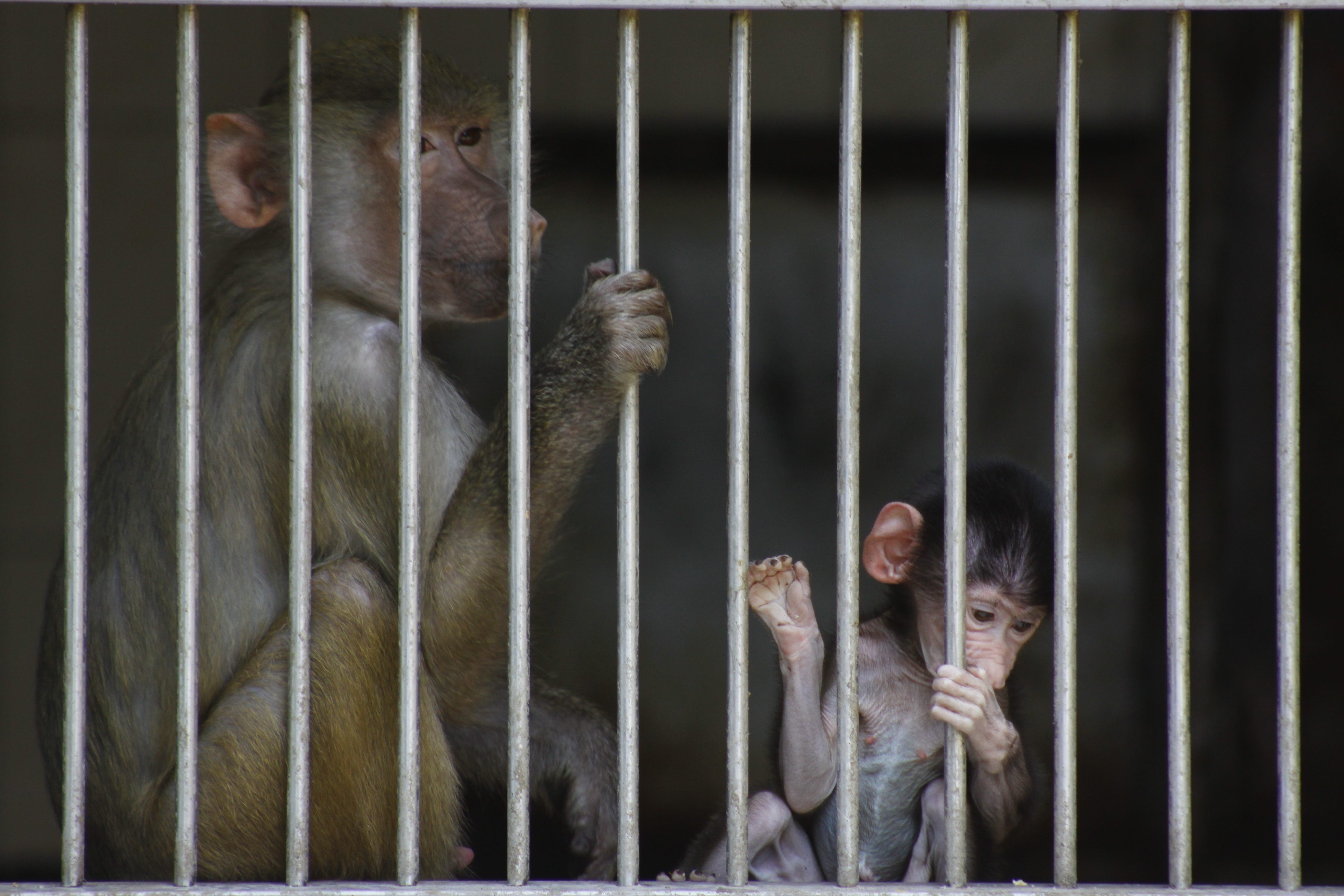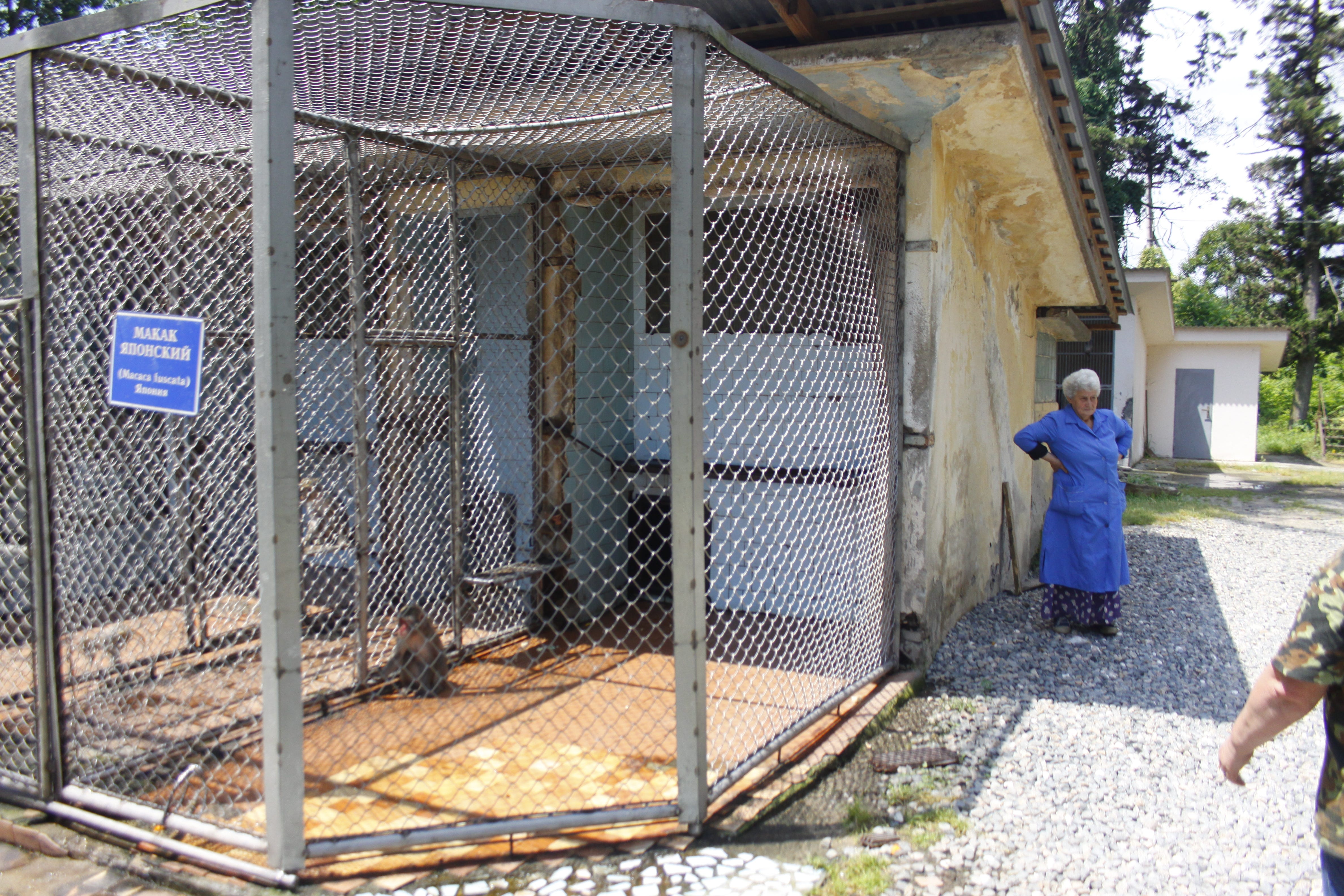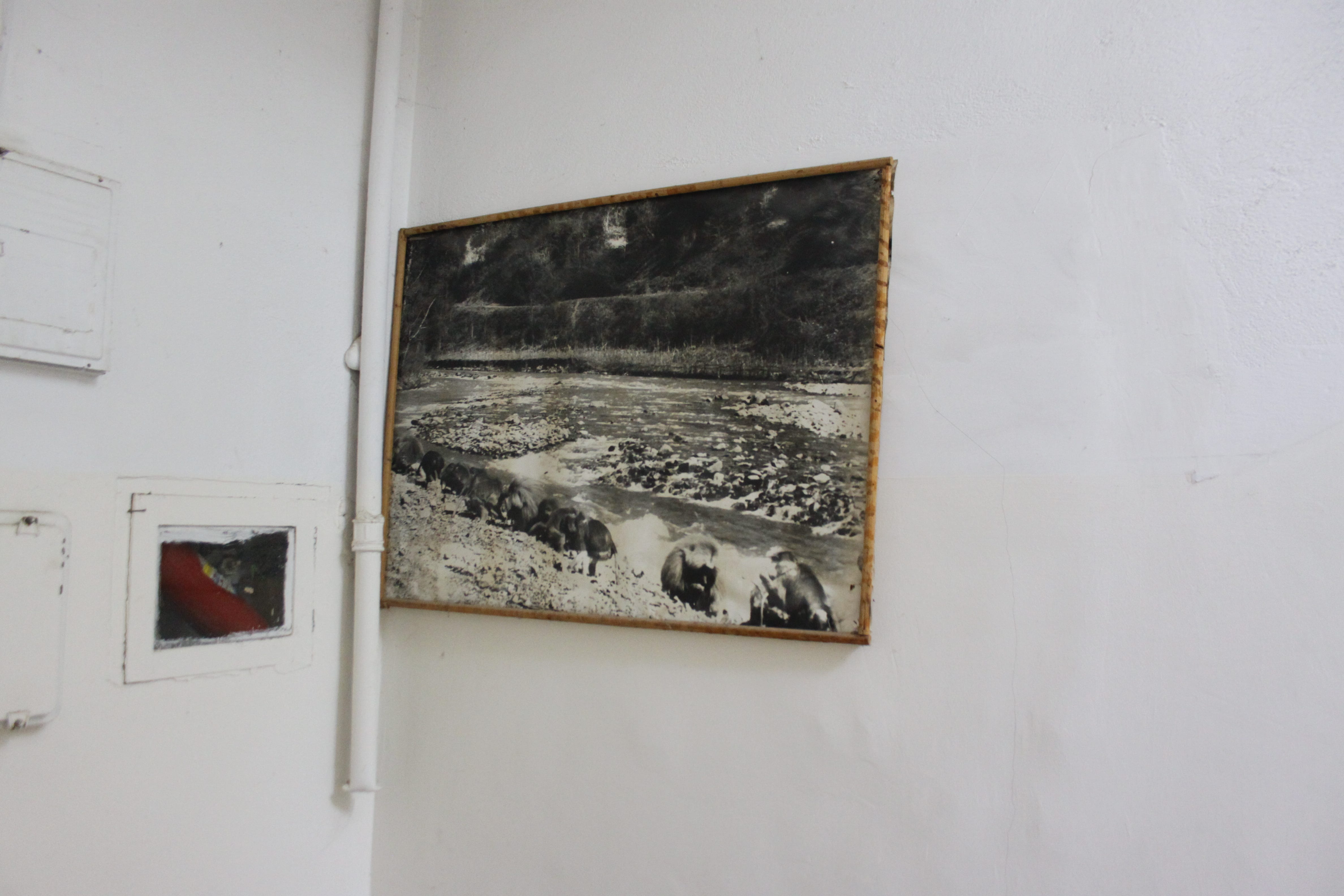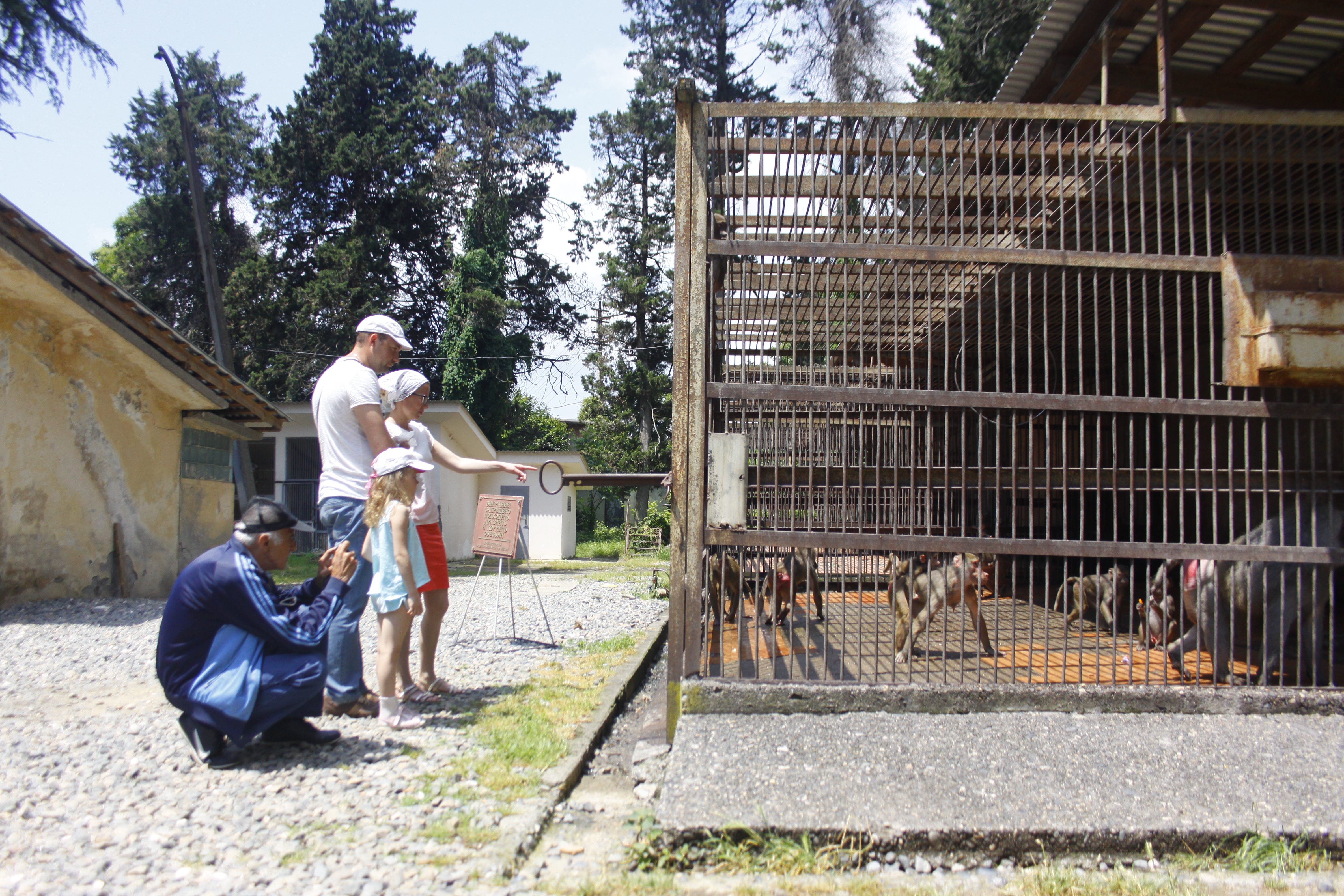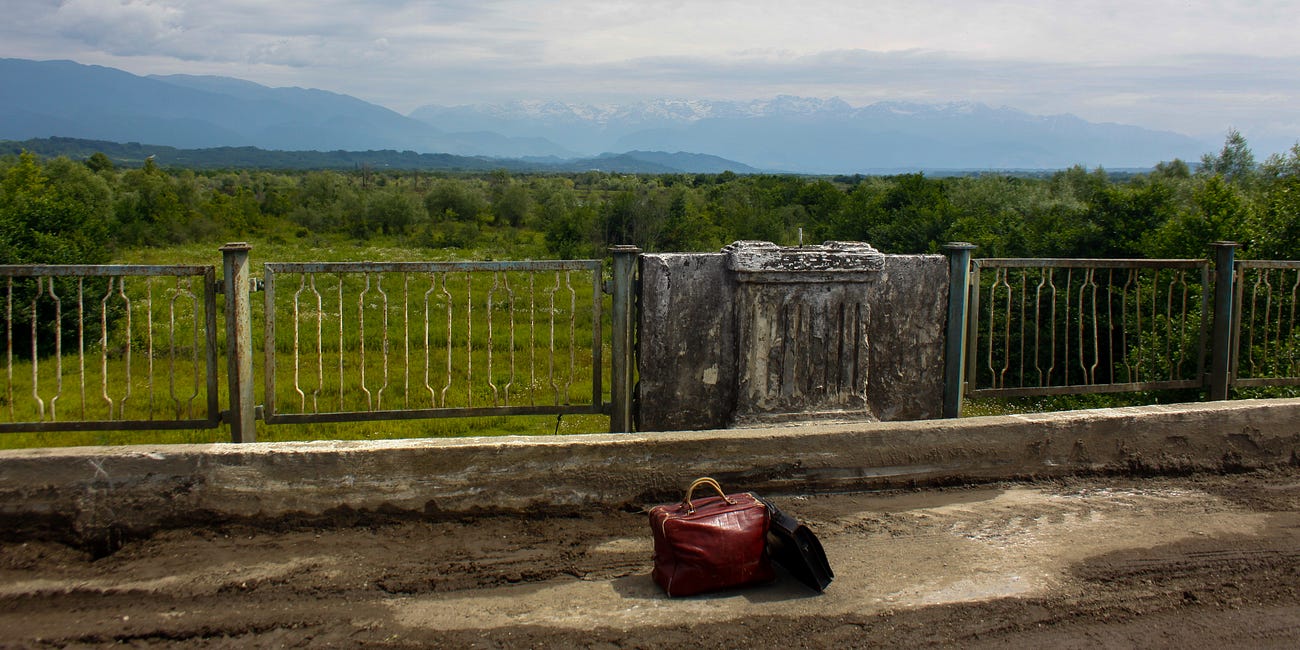A Special Space Monkey Museum Supplement
The weirdest day of all the weird days in Abkhazia
This is a special holiday supplement to the last post, The Country That Doesn’t Really Exist, in which I spent a few days tooling around in Abkhazia, between Georgia and Russia.
For a place with so many monkeys, the Soviet Space Monkey Museum was a little hard to find. It sits a little outside of the center of Sokhumi, in the low wooded hills to the north. On the map, it looks close, but my hotel insists on calling a taxi. “Hill,” is offered as an explanation.
It’s not really called the Soviet Space Monkey Museum, of course. On Google Maps it’s labelled The Monkey Nursery, a name that will be shown to be both accurate and cruel, but it’s officially called the “Research Institute of Experimental Pathology and Therapy in Abkhazia” yet I refer to it as the Soviet Space Monkey Museum because this is where monkeys were trained to be sent into space. This is not hearsay. This is, at least according to one sad exhibit at said Soviet Space Monkey Museum, historical fact.
I decline the hotel’s offer of a taxi and decide to walk. It’s a fresh summer morning, the trees still heavy with last night’s rain. The damp road up to the nursery/zoo/museum glistened in the early sun. It’s a peaceful stroll, and easy to forget that a sort-of city lies nearby. There are few buildings, few cars, few people—just leafy trees jostling gently in the breeze.
Such is the tranquility that it doesn’t take long for me to assume I’m going the wrong way. I don’t hear any monkeys, which feels like a clue. The road rises and then makes a hairpin turn, doubling back on top of itself. I try to check a map on my phone, but it’s pointless here. I just keep walking, trying to read the few signs on the road, but my shaky ability to read Cyrillic characters by slowly and foolishly sounding them out only serves to make the journey longer. I look for clues in the letters, but it’s pointless: I don’t know the word for monkey anyway. I can really only read the names of some cities and the word “restaurant.”
But I carry on upward, confident in the smallness of Sokhumi and how little time it would take to backtrack, and before long I spot some souvenir stands covered in monkey paraphernalia and I know I’m in the right place. Well, a place.
A set up stairs leads up between the souvenir stands, the walls on either side of the stairs covered in photos of monkeys. Perhaps famous monkeys. No explanations are offered, in Russian or otherwise. There are pictures of various apes in various states of captivity, some lounging on furniture or standing in a field, others peering out between bars. There’s a picture of a little monkey in a little space suit, with a sad little helmet.
The Soviet Union was not famed for its treatment of animals, especially its space-bound research animals. Laika, the poor stray dog sent to her death in low orbit in 1957, is the most famous of these animals, but the Soviet Space Monkey Museum is a relic of that same long hand of cruelty. Here, other animals were “trained” for their space journeys, which essentially just meant being kept in cages until called up for certain death and unspeakable suffering.
It’s home to other terrifying legends too, like a human-ape cross-breeding program. Again, information is hard to come by on all things Abkhazia, but the sole English-language website that describes the Monkey Nursery quotes a scientist from the nursery telling The Guardian that she had read about these types of experiments being carried out in the 1930s in an effort to create a kind of brainless superstrong farmer/soldier/citizen. There’s predictably little evidence to support this claim, but no smoke without fire and all that.
These urban legends, and the very real photo of a monkey in a space suit, added an air of menace to an already depressing place. The nursery has become something of a pathetic zoo, the monkeys despairing in cages around a small forested area. The cages and larger enclosures had a distinctly Abkhazian air to them, everything in that now-familiar state of advanced disrepair. In some cages an attempt at a habitat had been lazily made, with a log placed here or there for the monkeys to climb, but most of them had only bare cement floors and chain link fencing, with little doors at the back surely leading to some grimmer, more terrible place.
There was a ticket booth charging a nominal fee for entry, and a few local tourists gathered to gawk at the monkeys, to read the plaques, to enjoy the summer sun. I even saw one of the football teams from the World Cup of Unrecognized Countries, all in matching track suits, looking uncomfortable in the bizarre central area of the nursery. Here, the cages were all facing center, where a huge ape statue looked formidably out toward the sea, a stony king surrounding by his unwilling subjects.
I dutifully visited every sad enclosure and tried to make eye contact with every forlorn monkey. This is not a thing monkeys really do, but I was desperate for a moment of connection in this weird place and the research monkeys had a kind of expression of defeated bewilderment that was the most honest I’d seen in Abkhazia. “We’re done,” they were admitting. “This is the hand we were dealt, and we’ll eat as much of this dry-looking grass as it takes to pass the time until we die here. But, hey, at least we have that statue of the god monkey to look at!”
Visiting all of the monkeys only took about 15 minutes, at which point my eyes began to wander from the cages in search of something. These were the days in which I still possessed a journalistic instinct, a nose for a story or at the very least a half-tuned ear for one. That instinct manifested as a kind of weird itchy sensation, a tingling of the scalp. You’ve probably felt some form of it. Through the trees I kept spotting one building with a very suspicious characteristic here: windows. Something wasn’t right. I had to investigate.
Ever the excellent actor, I asked the person at the ticket booth where the bathrooms were. When she pointed down the stairs, I pointed up the stairs to the building and said, “Okay, there! Great.” She blinked and said nothing, and with that I had permission to explore.
Upon closer inspection, the building had glass in place across more than 90% of its windows, which raised a few alarm bells. The doors were unlocked, which put some of the alarm bells right back down. I walked in, still under the pretense of looking for a bathroom. There was a kind of reception area like in a small-town hospital, tucked to one side of the hall and unsurprisingly deserted. It had an ancient-looking computer and a very dusty telephone and it was covered in papers that looked, like many things here, to have simply been left behind in a hurry. The hallway was long and had no doors on either side, just a long corridor leading to a set of stairs at the end. So the choice was made for me. I headed for the stairs, walking slowly as though I was trying to hide my footfalls, which squeaked on the linoleum floor and echoed loudly in the empty hall.
The first floor of the building had another hallway, this one lined with doors, all closed and windowless, some bearing plaques in Russian. At the end of the hallway was a pair of swinging metal doors, tiny windows covered with mesh rather than glass. The doors were flapping slightly, as though someone had just walked through. This was both an invitation and a warning to me. There was someone else here.
What would happen if I was caught trespassing here? Was I even trespassing? I had bought a ticket to this place, sort of. There were no locked doors. I was here as a guest. Normally I would have no hesitation in this kind of situation, but I was shaken by the hundreds of languishing monkeys and those pictures of that one in its little space suit. This wasn’t a normal place, where nice people did kind things. Would I be captured and tortured? Visions of huge needles flashed in my imagination, of straightjackets and bald men with clipboards taking note of my reaction to different periods of time without oxygen. I briefly wondered if they had a monkeynaut helmet in my size—I was quite a bit bigger than that monkey in the photo. How embarrassing it would be to die here in a too-small space suit, with the buttons and buckles not quite closed.
But I had come all this way: across the ruined bridge, through the dead towns. I had walked along the haunted skeleton coast of Sokhumi. I’d watched the worst football match of all time. I had paid my dues, damn it. Besides, one of my travel rules is to always try to find out what’s on the other side of the door. So, I opened the swinging doors.
Behind these lay another apparent ruin of Abkhazia. There were hospital beds lying around in no particular order, some near windows and medical machines that were turned off and unplugged, some just kind of pushed into one corner. There were metal countertops covered in glassware and surgical equipment. There was a framed portrait of an old white guy over a desk in the corner, where the most shocking sight of all was waiting: a heavy-set woman in her 40s or early 50s, her brown hair neatly arranged in a tight bun atop her head, green glasses lowered to the tip of her long nose. She was wearing a white lab coat. On the desk in front of her was a clipboard. She was sleeping. Or dead. I admit that I assumed the latter because it suited the place better, but then she shifted slightly and started snoring softly. I froze, but in the new silence without my footfalls she stirred, pushed her glasses back up her nose, and immediately spotted me. She let out a little shriek and sat up, wiping drool from her lip. She mumbled something in Russian, then picked up a cell phone from her desk and began rubbing idly, completely ignoring me. I heard the clicking of heels in the hallway and the door swung open, another woman in a white lab coat entering and saying something to the one seated at the desk. The desk lady grunted and nodded in my direction, and the new arrival turned to give me a once-over. She said something in Russian, and I said hello in English.
“You are here for what?” she then says in English. She also had her hair pulled into a tight bun, also wore glasses. Reassuringly, she didn’t have a clipboard.
“Tourism!” I beam, willfully misunderstanding the question.
“No, not tourism,” she says, kind of smiling but also kind of visibly annoyed. “Here.” She pointed at the floor. “Here. What?”
“Ohhhhhh! Here?” I chew on this for a minute, ever-smiling.
“Camera?” she asks, pointing at my camera, a big SLR that I carry everywhere. “Why camera?”
“Yes, camera!” This is usually an escape. I turned on the camera and began showing her photos I had taken that day: the monkeys in cages, the monkey statue, my breakfast at the hotel. Soon we’re in the previous day’s photos: the seafront, the stadium, some wide shots of the football match. She clapped briefly, that patriotism flaring up.
“Game good,” she says. “We win.”
A moment passes in a kind of happy silence, me taking in the room and both women staring at me awkwardly. The woman at the desk says something that I took to mean, “What were you talking about?” and a conversation ensues between them that includes some more clapping from the one at the desk, presumably when recapping the football game the night before. More moments pass, and I feel I’ve gotten away with one and say, “Thank you. Bye.”
The air in the room changes. It becomes charged.
“Moment,” says the English-speaking one. “Moment. Wait.” She reaches out to touch my arm, a semi-polite you’re-not-going-anywhere touch. “You here … why?” She hasn’t abandoned her original question, and I haven’t answered it. I hear more footsteps outside in the hall, and the door sings open once more. A bald man in a white lab coat enters, carrying a clipboard, making the number of clipboards and lab coats too high. I quickly try to decide if I could overpower all these people in a fight, but I’d never been in a fight.
The man locks eyes with me. He then looks to the two women, who suddenly seem on edge, their postures tense. In that moment, I realize that I don’t have a will and that I haven’t bequeathed my savings to my dog, and am filled with regret. Hey, at least I’d get some free bananas and would get to go to space for a couple of hours!
“You,” says the man. “Why are you in here?” His English is unsettlingly confident.
“Isn’t the part of the museum?” I ask.
“What museum?” he asks back.
“The monkey one?”
“This isn’t a museum.”
“Then what is it?”
“It’s a research facility.” He says this with a distinct lack of irony.
“Oh, is it? What kind of research?” Always see what’s on the other side of the door, right?
He thought for a moment, maybe searching for the word, maybe measuring me for my space suit. Then he took a tired breath.
“Biology.”
I nodded. I no longer thought I was going to die. This man just seems like everyone else here: vaguely well-meaning but mostly exhausted and defeated. It was then up to me to break the weird silence.
“The person at the ticket booth said there was a bathroom in here?”
“Bathroom?” he says in English. Then he repeats something in Russian, and the two women echo the word. They all say it once or twice more, whatever it is, then burst out laughing. These are the first smiles I’ve seen in Abkhazia. “Bathroom!” he shouts, then slaps my back. “Of course. Let me show you.”
The Country That Doesn't Really Exist
The bridge is empty except for a mule-drawn carriage bumping slowly northward. It’s been so long since this was used as a road, yet a few pieces of tarmac still cling stubbornly to the surface. Most of the old highway has been worn down to dirt, and much of that dirt has been worn down to potholes f…


